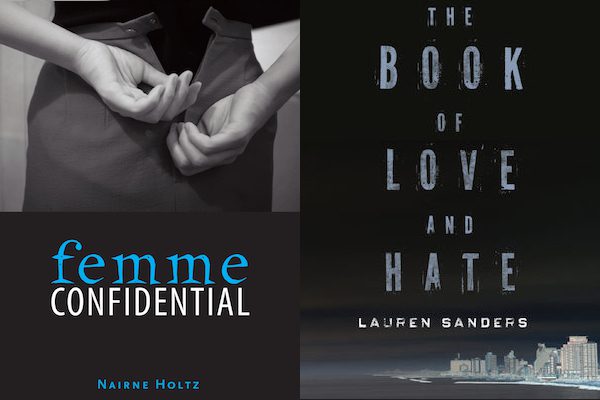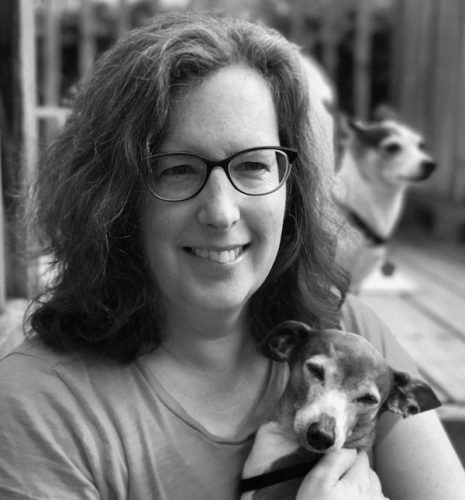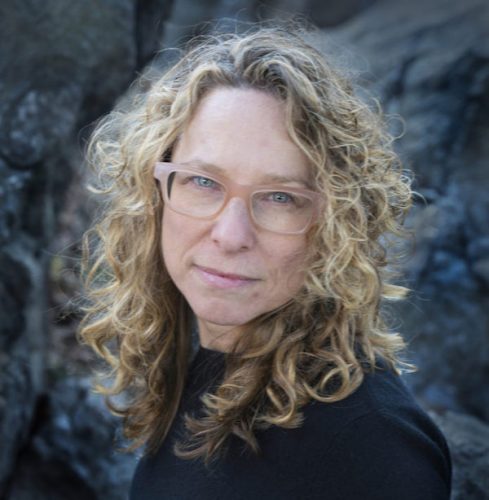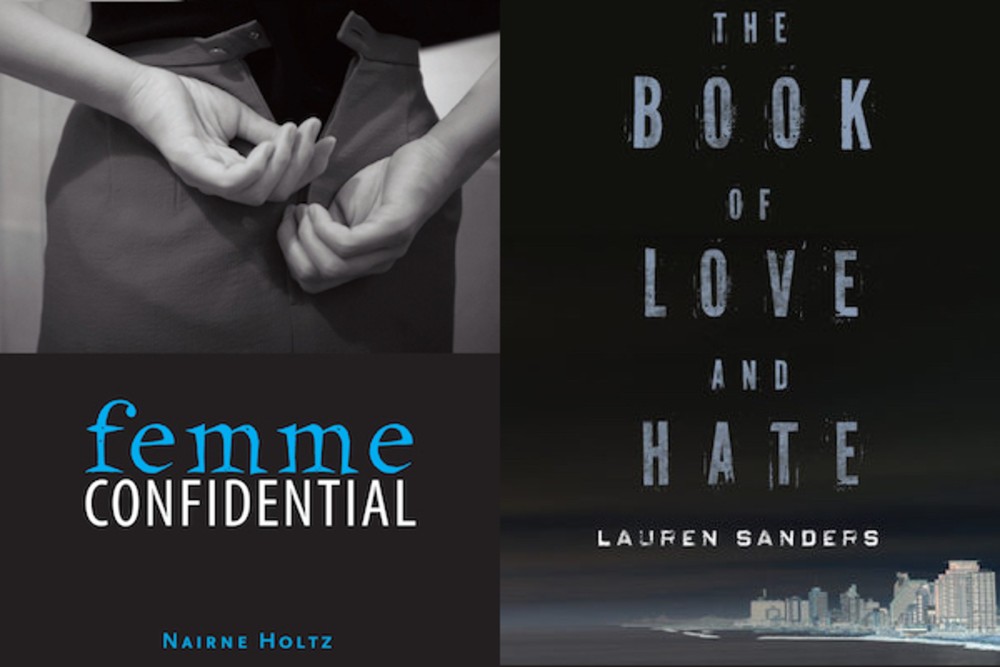Nairne Holtz & Lauren Sanders on Celebrity Crushes, Sex Scenes, and Dyke Life

Author: Edit Team
November 7, 2018
“I was delighted to meet Lauren Sanders at Saints & Sinners 2018 as her novel Kamikaze Lust is one of my favorite books. We chatted about being with small indie presses and how writing books with central lesbian characters and storylines felt more interesting, felt right, whatever the cost in terms of reaching a larger audience. It felt like we had more to say, so we decided to interview each other.” –Nairne Holtz

Nairne Holtz: All of your novels feature bad girl heroines–a nice Jewish girl wallowing in sex and death in Kamikaze Lust, a stalker-cum-killer in With or Without You and a nihilistic alcoholic in The Book of Love and Hate. Why are you drawn to such dark themes? Do you think goodness is boring to write about?
Lauren Sanders: I don’t think anything is boring to write about if you scrape below the surface. That’s a constant theme for the alternative lit set, right? You can’t just write a love story, a thriller, etc. You have to give room to the story beneath the story. Something I’ve always been drawn to is identity, or the multiple identities we wear throughout our lives. Some of those may be “good” and others “bad” or more dark, but we as humans live in societies where we are often rewarded for the good and punished for the bad. I like to imagine individuals, women mostly, who are letting their inner bad girl fly free. Then I stack the odds against them by putting them in untenable scenarios…the porn industry, prison, the so-called state of Israel. This is an intriguing set up for both internal and external tension.
But let’s talk about goodness or just living a “normal” life for a second. I’m writing a book now where the characters are not as damaged outright, they’re upstanding, moral citizens, or whatever. They’re trying to live “good” lives and still they terrorize one another, break each other’s hearts and fail themselves over and over again. Which seems like life. And brings me to your book Femme Confidential. I was struck by how you brought such complexity to characters who in many ways were just feeling their way through life—and it was so evocative of the 90s, which at least in New York is considered by many of us to be a golden age of lesbianism—there were a few years where it seemed like everyone was sleeping with women. I’m biased, of course.
Did you set out to capture a time period? A community? How we live and love and betray one another then get up the next morning and do it all again?
Holtz: I’m a librarian so my work has an archival element; I definitely wanted to create a record of what dyke life was like for my friends and me in the 90s and 00s. My second book, This One’s Going to Last Forever, which is mostly about failed romantic relationships, was criticized for being dark. I thought it was optimistic because the characters change and grow but admittedly it does address harder issues such as the impact of rape, internalized homophobia, disability, substance abuse and so on. So I thought, okay, in Femme Confidential no one is going to be a rape survivor, and everyone is going to find love. And in my personal queer world, which admittedly is populated by folks with multiple forms of outsider-dom, “ever after” does exist—though it is far removed from the monogamous nuclear family or the idealized world of lesbian romance novels. So what you see in Femme Confidential reflects that diversity, that messiness as well as explorations of alternative sexual models.
I’m not moralistic but I am, at heart, a moralist. So I wouldn’t say my heroines betray each other again and again. I would say they make mistakes and learn from them. And my novel imparts some advice about how to be forgiven, how to take responsibility. One way in which dykes (and of course, we aren’t monolithic) are different from straight people is our tendency to make friends with our exes—and that can mean getting past a lot of shit.
Do you consider yourself a moralist? I felt as though you as the author had a lot of compassion for the fucked up protagonists in With or Without You and The Book of Love and Hate and your critique was less individual and more societal, that is to say, reserved for the celebrity-obsessed, reality-denying aspects of American culture. Do you agree? Also, have you ever been crushed out on a celebrity?

Sanders: I do think I am a moralist, too, though I always try to be careful talking about morality. I don’t believe in absolutes or universal truth. Though I am the child of lawyers and something of a rule follower myself, I am obsessed with people who break rules (particularly those bad girls!) or characters that bend rules for a higher calling, which is where my compassion for Lily in With Or Without You stems from. She believes her love for the soap star she kills to be the purest form of love in the universe because for her it is all encompassing, and doesn’t get distracted by any of the mucky human factors real people have. And her love is just a few notches above the low-grade obsession that fuels a lot of what we call love in pop culture and the general hagiography we create around celebrities. But to get from large-scale worship to falling in love with someone you don’t really know, your soul has to be somewhat damaged, so that’s the driving question of the book…how did this kid get so damaged by society and the people around her?
I think a version of the same question haunts Jen, the protagonist in The Book of Love and Hate. Here you have a character that grew up, literally, in the belly of American capitalism, which has made her family very rich and at the same time left them all a bit morally bereft. Jen thought she could keep her distance from her family history, live her life and be a “good person,” but when her own indifference smacks her in the face, she realizes she has no idea what’s good or bad or right or wrong, love/hate, etc. And, of course, she falls for her father’s lover who’s a former Mossad agent and corporate spy—a very bad girl—so that amps the family trauma even further. You talk about your book being criticized as too dark, which I think is ridiculous, by the way, the best novels dig deep into the pit of the soul…that said, as I’m writing sometimes I do make myself so angry, depressed and even feel sadistic dragging my characters though so much physical and emotional mud. But that’s the job. If you don’t feel it nobody else will.
OK, celebrity crushes…I’ve had tons of fly-bys but I would say, embarrassingly, one I fell hard for was Madonna in her Erotica period. She was arguably the most famous pop star in the world and speaking directly to queer people, which was thrilling. Of course, she was also appropriating, etc. but at the time the raunchy, sexy, sex-positive, flirting with Sandra Bernhard, sex book Madonna—she was just so alluring. I was dying to meet her but also would have been terrified. Your turn. :)
I have a question for you about sex and writing. Femme Confidential feels so true in its depiction of people’s sexual relationships. Sometimes I read books and the sex is either totally skipped over or used salaciously or manipulatively or misogynistically, and in your book I thought the sex felt honest and raw and sexy, which then gives rise to so many other feelings. What do you think writing so blatantly and frankly about sex does in a work of fiction? And the million dollar question, do you think there are different rules for men and women when writing about sex?
Holtz: Let’s start with celebrity crushes. I don’t get them, I think, because I prefer to be the object of obsession, plus I’m attracted to gay women on the masculine side of the spectrum—which eliminates most celebrities. That said, when I was thirteen years old and completely oblivious to my same-sex desires, I watched the movie Little Darlings three times because I was enthralled with Kristy McNichol, the lead actress. In the movie, she plays a working class tomboy at an all-girl camp who is dyke-baited into a contest to lose her virginity. I was so fascinated by this movie that I started a novel (my first) with the same concept only told from the point of view of a boy—ergo girls were the love interest—who competes with another boy to lose his virginity. I let a friend read the manuscript and before I knew it, other girls in my class wanted to read it. What happened to it I have no idea, but clearly I’ve been consistent in my attractions (Kristy McNichol eventually came out) and interest in writing and thinking about sex!
I’m not entirely sure why sex is a theme in my writing. Offering an antidote to sexist, dishonest depictions of sexuality is part of it. Personally, I think sex scenes in fiction are an excellent vehicle for revealing character, power dynamics, and the nature of relationships. Sure, some people are disinterested or uncomfortable reading about sex and some reviewers won’t review me, but what else is new? I already get that because I write about dykes and set my work in the queer community.
I think I’m too removed from mainstream writing to comment on whether there are different rules for men and women or other groups for that matter. It does seem as if these days fiction about sex is shunted into romance or erotica whereas in the 70s authors like Erica Jong and Philip Roth treated sex both explicitly and seriously.
And that brings me to my last spate of questions: Are you influenced by queer writers or not so much? What writers have influenced you?
Sanders: You wrote Little Darlings fan fiction! There’s got to be an Internet group for that.
I do think literary writing about sex was more dangerous and exciting in the 70s and 80s, perhaps because much of it was so new. Now, sex scenes are so been there, done that…but I remember when I first got my hands on Fear of Flying as a teenager and could not believe what I was reading…all the f-bombs and cocks and wet pussies. Several years later I was reading Lolita and Pat Califia’s Macho Sluts at the same time (grad school is amazing for literary juxtapositions!)…and both books, for very different reasons, energized me with the same “Whoa, you’re allowed to do this?” I started thinking what if you could write with Nabokov’s language and psychological dimensions on Califia’s turf? That’s about as queer influenced as I get, though I do feel like I am always writing in a queer community and in a dialogue with other queer writers. I’m also completely omnivorous (and a bit of a serial monogamist) in my reading, if I love the book I’m reading it is THE BEST BOOK EVER…until I get to the next one. But the books that turn my heart inside out and have taught me the most are usually big, messy, overly ambitious novels. I’m a lifelong fan of DeLillo for this reason, Nabokov of course, Mary Gaitskill, Djuna Barnes for her operatic notions of lesbians in love, tragedy and all. Hanya Yanagihara’s A Little Life is a recent masterpiece.
And you, what books would you take to the proverbial desert island (assume there’s no where to plug in an e-reader stuffed with hundreds)?
Holtz: A desert island seems like a 70s, 80s throwback…let’s say heading off the grid and preparing for the apocalypse! I read constantly and might be able to narrow it to 100 books, sigh. But for that “whoa, this is possible” feeling I’d have to credit Sarah Schulman’s Girls, Visions and Everything and Jaime Hernandez’s Love and Rockets comics (I have a small tattoo of Hopey on my arm). Their work created a space that allowed me to imagine writing literary fiction about my punk dyke life. My style, on the other hand, is so dry with lots of banter between the characters that I suspect all those 19th century novels I read while getting a graduate degree in English Literature rubbed off. I’ve loved Mary Gaitskill from her first book—her screwed-up girl terrain crafted in the most exquisite sentences is inimitable. And finally, publications like On Our Backs and an old friend’s zine, Brat Attack, and Patrick Califia and Susie Bright and Dorothy Allison and Chrystos were inspirations that influenced and affirmed my thinking about sexuality and about class.
I would say The Big Book of Love and Hate has a definite whiff of DeLillo.
Sanders: Ha! Yes, with a sprinkling of Haruki Murakami’s ghosts!
Lauren Sanders is the author of the critically acclaimed novels Kamikaze Lust (Akashic Books, 2000), which won a Lambda Literary Award, and With or Without You (Akashic Books, 2005), a Lambda Literary Award finalist. Her writing has appeared in publications including Book Forum, the American Book Review, and the Best Lesbian Erotica series. Her most recent novel is The Book of Love and Hate (Akashic Books, 2017). She lives in the great nation of Brooklyn with her girlfriend and her pit-mix Maverick.
Nairne Holtz began her writing career in the early 90s with the creation of a pansexual queer porn zine, Pornorama. Today she manages a law library and is the author of several works of fiction. The Skin Beneath (Insomniac, 2007) was shortlisted for Quebec’s McAuslan First Book Prize and This One’s Going to Last Forever (Insomniac, 2009) was a Lambda Literary Award finalist. Her new novel, Femme Confidential, was released at the end of 2017.

